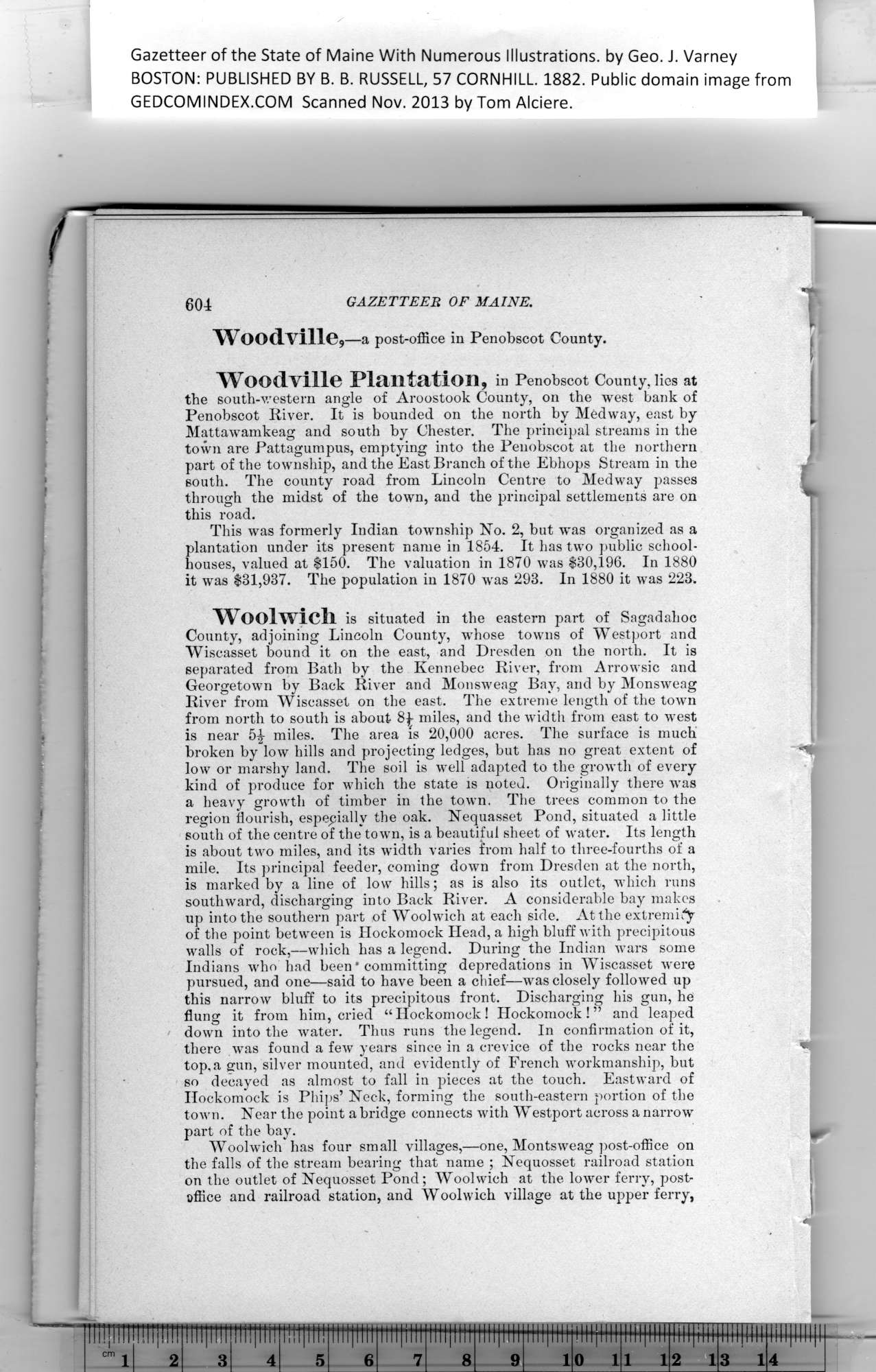|
Gazetteer of the State of Maine With Numerous Illustrations, by Geo. J. Varney
BOSTON: PUBLISHED BY B. B. RUSSELL, 57 CORNHILL. 1882. Public domain image from
604 GAZETTEER OF MAINE.
Woodville,—a post-office in Penobscot County.
Woodville Plantation, in Penobscot County, lies at
the south-western angle of Aroostook County, on the west bank of
Penobscot River. It is bounded on the north by Medway, east by
Mattawamkeag and south by Chester. The principal streams in the
town are Pattagumpus, emptying into the Penobscot at the northern
part of the township, and the East Branch of the Ebhops Stream in the
south. The county road from Lincoln Centre to Medway passes
through the midst of the town, and the principal settlements are on
this road.
This was formerly Indian township No. 2, but was organized as a
plantation under its present name in 1854. It has two public school-
houses, valued at $150. The valuation in 1870 was $30,196. In 1880
it was $31,937. The population in 1870 was 293. In 1880 it was 223.
Woolwich is situated in the eastern part of Sagadahoc
County, adjoining Lincoln County, whose towns of Westport and
Wiscasset bound it on the east, and Dresden on the north. It is
separated from Bath by the Kennebec River, from Arrowsic and
Georgetown by Back River and Monsweag Bay, and by Monsweag
River from Wiscasset on the east. The extreme length of the town
from north to south is about 8f miles, and the width from east to west
is near 5£ miles. The area is 20,000 acres. The surface is much
broken by low bills and projecting ledges, but has no great extent of
low or marshy land. The soil is well adapted to the growth of every
kind of produce for which the state is noted. Originally there was
a heavy growth of timber in the town. The trees common to the
region flourish, especially the oak. Nequasset Pond, situated a little
south of the centre of the town, is a beautiful sheet of water. Its length
is about two miles, and its wddth varies from half to three-fourths of a
mile. Its principal feeder, coming down from Dresden at the north,
is marked by a line of low hills; as is also its outlet, which runs
southward, discharging into Back River. A considerable bay makes
up into the southern part of Woolwich at each side. At the extremity
of the point between is Hoekomock Head, a high bluff with precipitous
walls of rock,—which has a legend. During the Indian wars some
Indians who had been * committing depredations in Wiscasset were
pursued, and one—said to have been a chief—was closely followed up
this narrow bluff to its precipitous front. Discharging his gun, he
flung it from him, cried “ITockomock! ITockomock!” and leaped
down into the water. Thus runs the legend. In confirmation of it,
there was found a few years since in a crevice of the rocks near the
top,a sun, silver mounted, and evidently of French workmanship, hut
so decayed as almost to fall in pieces at the touch. Eastward of
Ilockomock is Phips’ Neck, forming the south-eastern portion of the
town. Near the point a bridge connects with Westport across a narrow
part of the bay.
Woolwich has four small villages,—one, Montsweag post-office on
the falls of the stream bearing that name ; Nequosset railroad station
on the outlet of Nequosset Pond; Woolwich at the lower ferry, post-
office and railroad station, and Woolwich village at the upper ferry,
PREVIOUS PAGE ... NEXT PAGE
This page was written in HTML using a program written in Python 3.2
|
